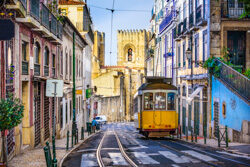
The most enjoyable activity while in the Alfama district is a ride on the number 28 tram, going through some of the oldest quarters and many tourist attractions. The tram route connects the district of Graça with Baixa and passes through the streets and hills of Alfama. This narrow and undulating tram route is totally unsuitable for any modern trams, so historic Remodelado trams, which date from the 1930s, provide the service instead.
The valley between hills makes up the Baixa, or lower town. The Baixa district is the heart of Lisbon and was completely rebuilt after the devastating 1755 earthquake. The district comprises of magnificent plazas, which are connected by straight avenues lined with grand 18th-century architecture. This is the district of Lisbon where tourists will spend the majority of their time. The streets are lined with cafes and buzzing nightlife is within walking distance. Baixa has many of Lisbon’s most important tourist attractions and the area is a great place to be based in.
Belem Tower is Lisbon’s most photographed building is found. The Belem tower stands on the shoreline, around 5km west of the centre of the city. The park and promenade in front of this chunky 16th century fortification are a popular spot for Lisbon families to enjoy the afternoon sunshine, and to watch the crowds of tourists presumably. The tower has been designated World Heritage Site status along with the nearby Jeronimo Monastery, and both are well worth the tram ride out of the city.
The castle of Lisbon, locally named Castelo de São Jorge is located right on top of the tallest of Lisbon´s seven hills of the historic centre of the capital city, above the old Moorish quarter. The castle is clearly visible from a long way off and it is famous for its panoramic views of the city and surrounding countryside. The Atlantic can be seen behind the 25 de Abril Bridge, Ponte 25 de Abril and on clear days the Padrão dos Descobrimentos and the Tower of Belem, Torre de Belém are visible in the distance.
In Lisbon, getting there really is part of the fun, as the charming clanking old trams are still the best way to reach the top of the steepest hills. A popular tram is number 28 that passes through the oldest quarters, while the colorful funiculars of Gloria and Bica are fun ways to reach Bairro Alto.
The Elevador de Santa Justa (Santa Justa Lift) is a beautifully crafted elevator that transports passengers from the Baixa district up to the ruins of the Igreja do Carmo church. The Elevador de Santa Justa is an industrial-age marvel, with the outer ironwork structure forming glorious neo-gothic arches, while inside two sumptuous polished wood carriages whisk passengers up in style.
Whether or not you like the style of music, dinner by candlelight listening to fado in Lisbon is unmissable. Consider yourself lucky and do stop, if you hear it sung while strolling through some street in Alfama, Mouraria or Madragoa. This style is the so-called fado vadio, or amateur, sung when someone gets the urge to sing, with the guitars simply joining in.